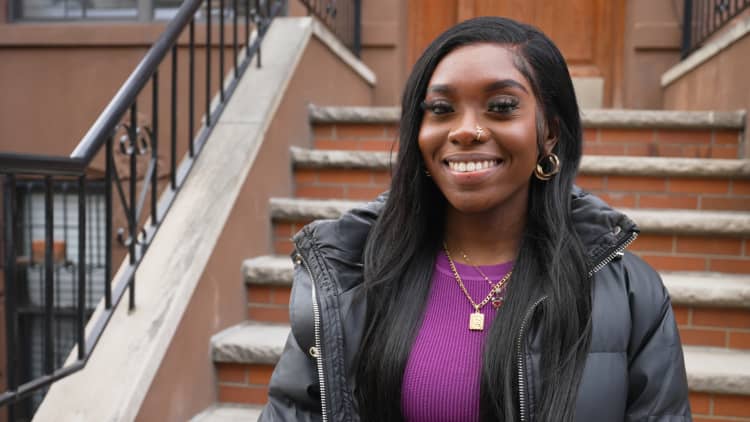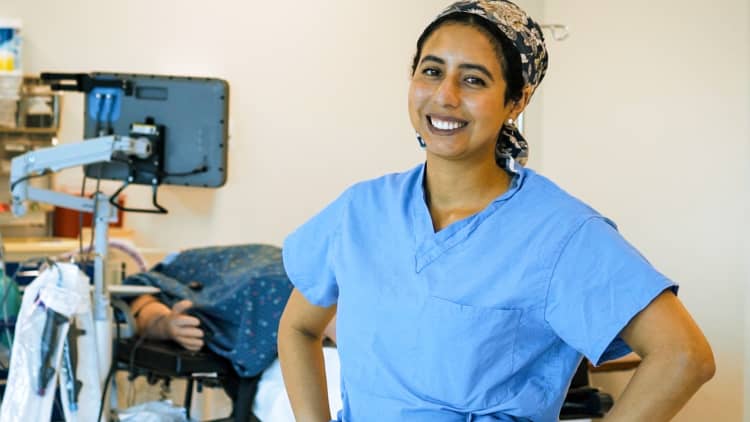Though she wanted to pursue a career in medicine, Chabely Rodriguez realized soon after earning her bachelor's degree that medical school wasn't for her.
The 28-year-old New York native graduated from her undergraduate program debt-free in 2017. But when it came time to apply for medical school, she realized both the time and financial commitments were bigger than she wanted to make.
"Financially, it wasn't going to make sense for me," Rodriguez recently told CNBC Make It.
She began exploring other medical careers that would require less time in school, but could still provide a solid income and allow her to pursue her passions for science and helping people. Research and networking with medical professionals introduced Rodriguez to the anesthesiologist assistant certification.
Certified anesthesiologist assistants are medical providers who "extend the care of an anesthesiologist," Rodriguez says. The career would tap into her critical thinking skills and love of chemistry, plus she could become a CAA with just a master's degree, no med school required.
Turning a $200,000 loan to a $200,000 annual income
Taking out $200,000 in student loans wouldn't make sense for a lot of people. But Rodriguez didn't have a lot of options for master's programs and they all cost upwards of $100,000.
Often, student loans are the only option for people to pay for their education. Still, experts recommend that you only borrow what you need and aim to keep your total student debt below the annual salary you anticipate earning after graduation. A high salary was part of what drew Rodriguez to anesthesiology, so she was pretty comfortable taking out such a large loan.
"Given that the salary would be around $150,000, I still pursued the profession knowing I would go into debt," she says. "But I felt like I had a realistic chance of paying it off within five years."
Though Rodriguez originally took out $200,000, the total cost of her master's degree was slightly lower so she was able to return part of the loan. She made some payments throughout school, but still had around $123,657 in debt when she graduated in August 2021.
Her first salary offer, however, was even higher than she anticipated. By the end of 2021, she was earning an annual base salary of $170,000. Putting in overtime also helped her bring her annual income up. She earned over $210,000 in 2022.
Taking advantage of the pandemic payment pause
Earning more money than she anticipated wasn't the only leg up Rodriguez got on her student loans. She made some payments while she was in school and after she graduated, but since all her loans were federal, Rodriguez realized she could be taking advantage of the pandemic pause on interest and payments.
Instead of continuing to make payments on the loans, she put that money into a high-yield savings account. By the end of 2022, she'd saved enough to wipe out her debt, but she didn't do so right away. She continued to save and let the money grow until student loan interest was about to resume accruing in September 2023.
In August, she made her final payment and eliminated her student debt. In total, she repaid $127,590.
3 tips for tackling your student debt
Rodriguez had a fairly ideal student loan situation. She earned a high income, only held federal loans and had the pandemic payment and interest pause on her side. Still, it took discipline and dedication to commit using that money to get out of debt.
Here are three tips that helped her stay focused.
1. Treat your repayment 'like a game'
Rodriguez initially wanted to pay off her student loans in five years. To accomplish that, she made a budget for herself and set a target amount to put toward her debt each month to "make it like a game," she says.
"When I hit [my target], it felt like I was making a lot of progress and it kept me motivated to keep hitting it every month and sometimes beat that budget in that month," Rodriguez says.
She was able to beat her five-year goal, paying off her loans in just two years, by challenging herself in this way.
2. Make sacrifices where you can
Though she could have reasonably afforded to live on her own while still paying off her student loans relatively quickly, Rodriguez chose to live with roommates in order to keep her living costs as low as possible.
"It is a sacrifice, but I think it's worth it," she says. "Even if it's just for one year, it can really put you ahead. That's what I did and I would do it again every time."
Living with roommates may not be feasible for everyone, but the point is to get comfortable with being uncomfortable in order to accomplish what's important to you. Most people can find a small, temporary sacrifice, such as deleting food delivery apps or cutting streaming services.
Given the amount of time she spent at work, Rodriguez recognized that having a home to herself wasn't a priority, but getting out of debt definitely was.
3. Find someone to hold you accountable
With so many Americans working on paying off student loans, it shouldn't be too hard for you to find a friend in a situation similar to yours. Rodriguez says she and a friend who also had student debt talked about their progress and held each other accountable.
"If my friend was working a lot and putting a lot of money toward his loans, I felt like I could do the same," she says.
Even if your friends have different financial goals, it's good to talk about them and find ways to support each other, such as suggesting low-cost or free activities or starting a friendly no-spend challenge.
DON'T MISS: Want to be smarter and more successful with your money, work & life? Sign up for our new newsletter!
Get CNBC's free Warren Buffett Guide to Investing, which distills the billionaire's No. 1 best piece of advice for regular investors, do's and don'ts, and three key investing principles into a clear and simple guidebook.




